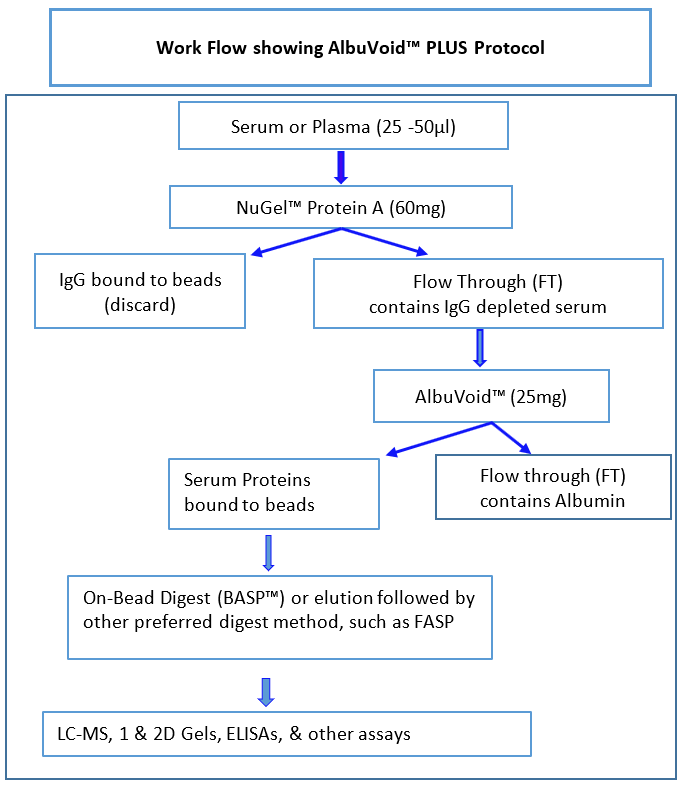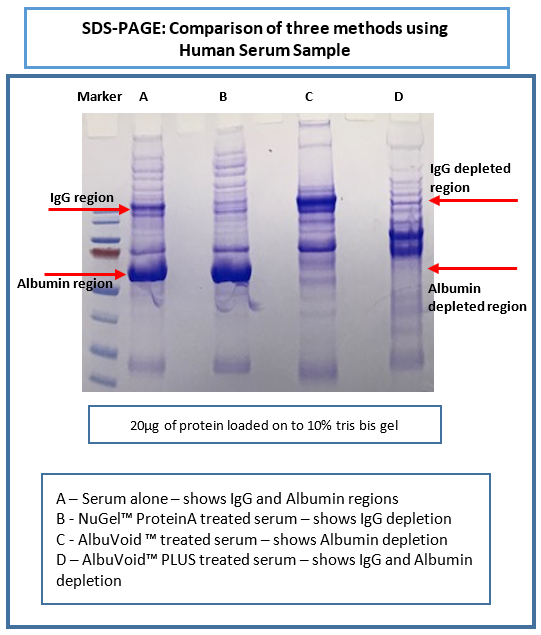
Tackling the Challenges of Serum Proteomics
Case Study: AlbuVoid™ PLUS - Albumin & IgG Depletion
Biotech Support Group offers distinct and diverse technologies to help researchers selectively tackle the challenges of serum proteomics, in order to achieve quality results. In this case study, we validate a unique two-step workflow, AlbuVoid™ PLUS, to deplete Albumin and IgG.
Background
Biotech Support Group (BSG) is a leading provider of proteomic sample preparation products. BSG has developed a simple workflow of two consumable products deplete Albumin & IgG in 30 minute protocol, with options for digestion.
- NuGel™ Protein A for IgG depletion
- AlbuVoid™ negative selection strategy for Albumin

By providing unrivalled specificity for researchers, as highlighted through one of their key BSG Advantages,
Enrichment/Depletion, NuGel™ Protein A and AlbuVoid™ are ideal products to support reliable IgG and Albumin depletion in a simple, cost-effective way.
The Challenge
Many proteomic enrichment strategies employ the use of immuno-affinity depletion to remove one or more high abundance proteins. However, some common limitations of immuno-affinity include: high costs, regeneration requirements (which may result in a diminished and inconsistent performance), as well as a required marriage of species to antibody.
Due to these limitations, such workflows have limited utility beyond discovery. For quantitative targeted serum proteomics, especially clinical proteomics, researchers need ways to consider the overall sample prep workflow including both enrichment and digestion.
Sample prep workflows that support serum proteomics can be especially challenging for many reasons, including:
- The presence of highly abundant proteins. Since Albumin accounts for about 50% of the total protein mass, this presents a unique challenge.
- Antibodies. - a particularly proteolytic resistant protein family. Also, the heterogeneity of antibodies generates unique LC-MS spectral noise, both features contributing to individual protein biases in the final analysis.
Such workflow challenges can become especially problematic for targeted quantitative proteomics as serum proteomes can have great variability in their abundances.
The Solution: AlbuVoid™ PLUS
To address the above challenges, Biotech Support Group created a new workflow which combines the advantages of a depletion strategy for IgG (NuGel™ Protein A), with the advantages of a negative selection strategy for Albumin (AlbuVoid™).
With some modest workflow adjustments, Viaralet et al. concluded that AlbuVoid™ proved to be faster and more cost-effective than antibody-based methods to improve quantitative clinical proteomics.
The combined protocol, illustrated below, is an innovative and effective product referred to as: AlbuVoid™ PLUS.

The Outcome

Our products, along with digest conditions, produce different proteome qualitative and quantitative windows of observation. A key feature of AlbuVoid™ PLUS is to not only to deplete IgG and Albumin, but also to simplify workflow for robust quantitative LC-MS analysis. With this understanding, we can guide the selection of products and protocols to achieve the best results for targeted quantitative studies.
Conclusions:
- The variable regions of Immunoglobulins are extremely heterogeneous, generating a background noise across the full LC gradient. On-bead digestion (BASP™) with after the AlbuVoid™ PLUS workflow substantially reduces the influence of such Ig peptide features. So in addition to workflow simplicity, BASP™ can be advantageous utilized in targeted proteomic workflows whenever the target proteins do not require strong denaturing conditions.
- With the exception of Immunoglobulins whereby FASP generates many more spectral features, both strong denaturing conditions (FASP) and on-bead digest (BASP™) conditions produce similar protein profiles. For certain proteins, a particular method can produce more spectral counts and may be better suited to targeted studies.
- So for targeted proteomics, we have a quantitative knowledgebase of over 1000 serum proteins to help select the best method(s) for particular protein(s).
If you are interested in learning more about tackling the challenges of serum proteomics, please contact our sales department at
sales@biotechsupportgroup.com.
Related References
- Zheng H, Soherwardy A, Roy S, Kuruc M, Avadhani S. AlbuVoid™ Enrichment & Antibody Depletion – Tackling the Challenges of Serum Proteomics Part II. Poster reprint first presented at 26th International Molecular Med TRI-CON, March 10-15, 2019, San Francisco, CA USA
- Vialaret, Jerome & Kadi, Sarah & Tiers, Laurent & O Flynn, Robin & Lehmann, Sylvain & Hirtz, Christophe. (2018). Albumin depletion of human serum to improve quantitative clinical proteomics. Current Topics in Peptide & Protein Research 19. 53-62. http://www.researchtrends.net/tia/abstract.asp?in=0&vn=19&tid=26&aid=6192&pub=2018&type=3
- Poillet-Perez, Laura, et al. "Autophagy maintains tumour growth through circulating arginine." Nature (2018): 1.
- Zheng, H., et al. "AlbuVoid™ coupled to on-bead digestion-tackling the challenges of serum proteomics." J Proteom Bioinformatics 8.9 (2015): 225.
- Zheng, H., et al. Poster reprint first presented at 14th Human Proteome Organization World Congress (HUPO 2015), held on September 27 – 30, 2015 entitled "New Proteomic Workflows Combine Albumin Depletion and On Bead Digestion, for Quantitative Cancer Serum Biomarkers".
|